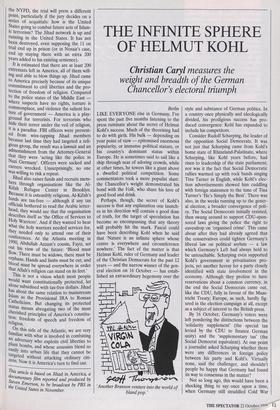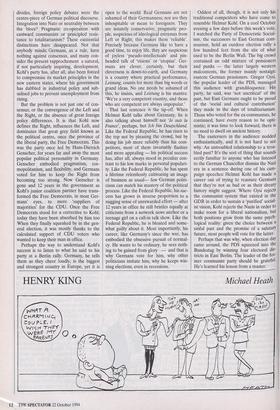THE INFINITE SPHERE OF HELMUT KOHL
Christian Caryl measures the
weight and breadth of the German Chancellor's electoral triumph
Berlin LIKE EVERYONE else in Germany, I've spent the past five months listening to the press ruminate about the secret of Helmut Kohl's success. Much of the theorising had to do with girth. His bulk — depending on your point of view — epitomised enormous popularity, or immense political stature, or his country's dominant status within Europe. He is sometimes said to sail like a ship through seas of adoring crowds, while at other times, he towers like a giant above a dwarfed political competition. Some commentators took a more populist slant: the Chancellor's weight demonstrated his bond with the Volk, who share his love of good food and drink.
Perhaps, though, the secret of Kohl's success is that any explanation one launch- es in his direction will contain a good dose of truth, for the target of speculation has become so encompassing that any theory will probably hit the mark. Pascal could have been describing Kohl when he said that 'Nature is an infinite sphere whose centre is everywhere and circumference nowhere.' The fact of the matter is that Helmut Kohl, ruler of Germany and leader of the Christian Democrats for the past 12 years — and the narrow winner of the gen- eral election on 16 October — has estab- lished an extraordinary hegemony over the `Another Branson venture into the world of bland pop.' style and substance of German politics. In a country once physically and ideologically divided, his prodigious success has pro- duced convergence: Kohl has expanded to include his competitors.
Consider Rudolf Scharping, the leader of the opposition Social Democrats. It was not just that Scharping came from Kohl's home state of Rhineland-Palatinate, where Scharping, like Kohl years before, had risen to leadership of the state parliament; nor was it the fact that Social Democratic rallies warmed up with rock bands singing Tina Turner in English, while Kohl's elec- tion advertisements showed him cuddling with foreign statesmen to the tune of Tina Turner's 'He's Simply the Best'. There was also, in the weeks running up to the gener- al election, a broader convergence of poli- cy. The Social Democrats initially resisted, then swung around to support CDU-spon- sored laws giving the police the right to eavesdrop on 'organised crime'. This came about after they had already agreed that the conservatives could tighten Germany's liberal law on political asylum — a law which Germany's Left had always held to be untouchable. Scharping even supported Kohl's government in privatisation pro- jects, yet another heresy for a party closely identified with state involvement in the economy. Although they profess to have reservations about a common currency, in the end the Social Democrats came out, like the CDU, fully in favour of the Maas- tricht Treaty; Europe, as such, hardly fig- ured in the election campaign at all, except as a subject of interest to the British press.
By 16 October, Germany's voters were left pondering the distinctions between the `solidarity supplement' (the special tax levied by the CDU to finance German unity) and the 'supplementary tax' (the Social Democrat equivalent). At one point a journalist asked Scharping whether there were any differences in foreign policy between his party and Kohl's. Virtually none, said the challenger, and shouldn't people be happy that Germany had found its way to consensus in the matter?
Not so long ago, this would have been a shocking thing to say: once upon a time, when Germany still straddled Cold War divides, foreign policy debates were the centre-piece of German political discourse. Integration into Nato or neutrality between the blocs? Pragmatic co-operation with eastward communists or principled resis- tance to totalitarianism? These existential distinctions have disappeared. Not that anybody minds: Germans, as a rule, have nothing against consensus, and many con- sider the present rapprochement a natural, if not particularly inspiring, development. Kohl's party has, after all, also been forced to compromise its market principles in the new eastern states, where his government has dabbled in industrial policy and sub- sidised jobs to prevent unemployment from rising.
But the problem is not just one of con- sensus, or the convergence of the Left and the Right, or the absence of great foreign policy differences. It is that Kohl now defines the Right, influences the Left, and dominates that great grey field known as the political centre, once the province of the liberal party, the Free Democrats. This was the party once led by Hans-Dietrich Genscher, for years far and away the most popular political personality in Germany. Genscher embodied pragmatism, cos- mopolitanism, and flexibility, and Germans voted for him to keep the Right from becoming too strong. Now Genscher is gone and 12 years in the government as Kohl's junior coalition partner have trans- formed the Free Democrats, in most Ger- mans' eyes, to mere 'suppliers of majorities' for the CDU. Once the Free Democrats stood for a corrective to Kohl; today they have been absorbed by him too When they finally squeaked by in the gen- eral election, it was mostly thanks to the calculated support of CDU voters who wanted to keep their man in office.
Perhaps the way to understand Kohl's success is to listen to what he said to his party at a Berlin rally. Germany, he tells them as they cheer loudly, is the biggest and strongest country in Europe, yet it is open to the world. Real Germans are not ashamed of their Germanness; nor are they inhospitable or mean to foreigners. They are innately conservative, pragmatic peo- ple, suspicious of ideological extremes from Left or Right; this makes them 'reliable'. Precisely because Germans like to have a good time, to enjoy life, they are suspicious of joyless 'pseudo-intellectuals' and pin- headed talk of 'visions' or 'utopias'. Ger- mans are clever, certainly, but their cleverness is down-to-earth, and Germany is a country where practical performance, Leistung, counts for more than big words or grand ideas. No one needs be ashamed of this, he insists, and Leistung is his mantra: `We're a very competent country, and those who are competent are always unpopular.'
That last sentence is the tip-off. When Helmut Kohl talks about Germany, he is also talking about himself: not `.1e suis la France', perhaps, but Ich bin Deutschland. Like the Federal Republic, he has risen to the top not by pleasing the crowd, but by doing his job more reliably than his com- petitors, most of them invariably flashier and more appealing — his political success has, after all, always stood in peculiar con- trast to his low marks in personal populari- ty. Like the Federal Republic, he has spent a lifetime relentlessly cultivating an image of business as usual— few 'German politi- cians can match his mastery of the political process. Like the Federal Republic, his suc- cess has grown in inverse proportion to a nagging sense of unrewarded effort — after 12 years in office he still bristles equally at criticisms from a network news anchor or a teenage girl on a call-in talk show. Like the Federal Republic, he is bloated and some- what guilty about it. Most importantly, his career, like Germany's since the war, has embodied the obsessive pursuit of normal- cy. He wants to be ordinary, he sees noth- ing to be gained from glory — and that is why Germans vote for him, why other politicians imitate him, why he keeps win- ning elections, even in recessions. Oddest of all, though, it is not only his traditional competitors who have come to resemble Helmut Kohl. On a cool October evening a few days before this week's vote, I watched the Party of Democratic Social- ism, the successors to East German com- munism, hold an outdoor election rally a few hundred feet from the site of what used to be the Berlin Wall. The big crowd contained an odd mixture of pensioners and punks — the latter largely western malcontents, the former mainly nostalgic eastern German pensioners. Gregor Gysi, the popular leader of the PDS, massaged this audience with grandiloquence. His, party, he said, was 'not uncritical' of the past, but East Germans ought to be proud of the 'social and cultural contribution' they made in the days of totalitarianism. Those who voted for the ex-communists, he continued, have every reason to be opti- mistic; it was time to look forward, there is no need to dwell on ancient history. The easterners in the audience nodded enthusiastically, and it is not hard to see why. An untroubled relationship to a trou- bled past? It's the sort of thing that sounds eerily familiar to anyone who has listened to the German Chancellor dismiss the Nazi era in a sentence during one of his cam- paign speeches: Helmut Kohl has made a career out of trying to reassure Germans that they're not as bad or as their dreary history might suggest. Where Gysi rejects the communist system that existed in the GDR in order to sustain a 'purified' social- ist vision, Kohl rejects the Nazis in order to make room for a liberal nationalism, but both positions grow from the same psych- logical reality: given the choice between a sinful past and the promise of a salutary future, most people will vote for the latter. Perhaps that was why, when election day came around, the PDS squeezed into the Bundestag by winning four electoral dis- tricts in East Berlin. The leader of the for- mer communist party should be grateful. He's learned his lesson from a master.











































































 Previous page
Previous page